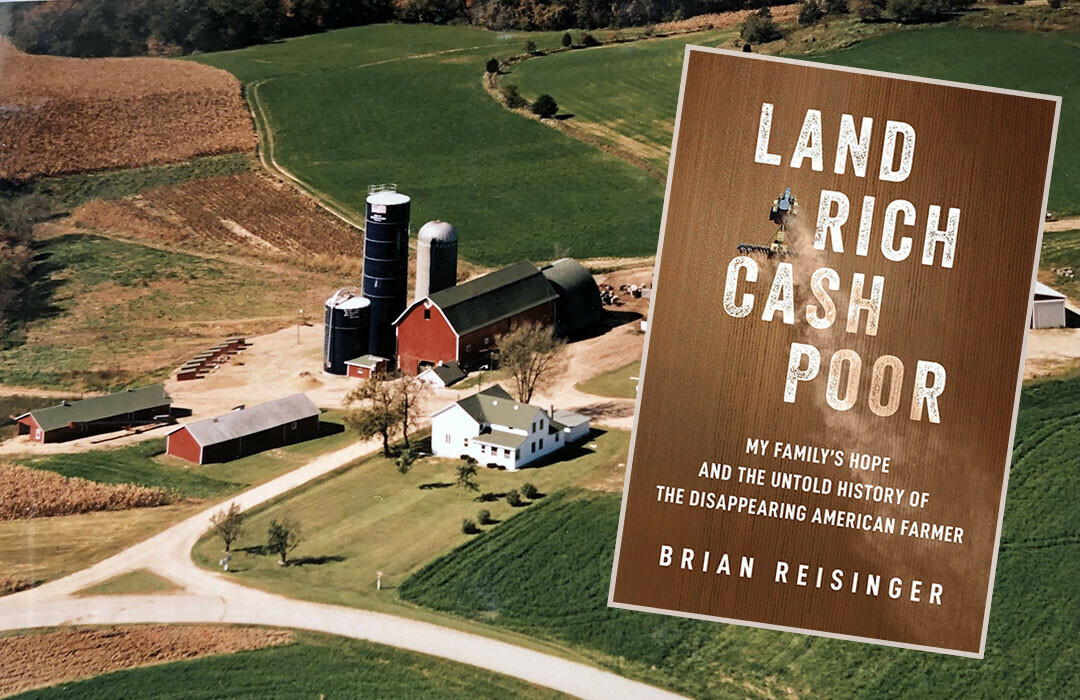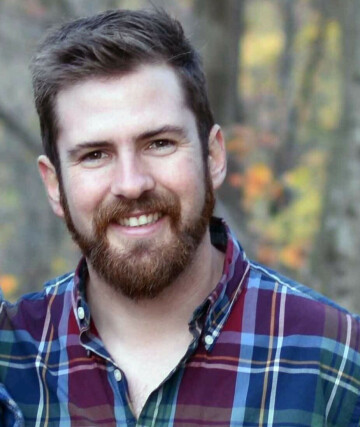‘LAND RICH, CASH POOR’: UWEC Alum’s New Book Explores Family Farm Woes
UWEC grad Brian Reisinger will read from book on Nov. 20 in E.C.

For as long as he can remember, writer Brian Reisinger says, he has been hearing about family farms going out of business. Growing up on a small Wisconsin dairy farm in the 1980s and 1990s, the decline of a way of life was palpable, even as his own family forged onward. And whether one sees this trend as lamentable or inevitable, the steady drumbeat has only grown louder over the ensuing years across rural America as well as here in America’s Dairyland.
It’s a sound that echoes through Reisinger’s new book, Land Rich, Cash Poor: My Family’s Hope and the Untold History of the Disappearing American Farmer (Skyhorse Publishing). As the subtitle implies, the volume uses the saga of the century-old Reisinger family farm to expose the challenges that have beset rural America, from the Great Depression of the 1930s to the Farm Crisis of the 1980s to contemporary issues of technology and trade. Throughout discussions of policies and politics, Reisinger – a UW-Eau Claire alumnus – continually weaves the emotional threads that tie farmers to their land, threads whose fraying have caused untold misery.
“In many ways, our family is kind of an example of what’s been going on. We’re kind of in the middle of the struggle,” Reisinger said in an interview a few days ahead of a Nov. 20 reading from Land Rich, Cash Poor at Dotters Books in Eau Claire.
Raised on a dairy farm in Sauk County, Reisinger loved the land but came to realize farming wasn’t the career for him. While he’s grateful the farm provided his family the middle-class financial means that allowed him to be the first in his family to graduate from college, he acknowledges that pursuing a life and career off the farm was a bittersweet decision.
”
Selling the cows is like a death in the family.
BRIAN REISINGER
AUTHOR, "LAND RICH, CASH POOR"
It’s clear from Reisinger’s recounting of America’s agricultural history that such hard choices are inevitable for families that work the land. The book is full of frightening statistics for those who care about the nation’s farm economy, the stability of rural America, and the strength of our food systems. Consider the following: Today, there are an estimated 59,000 farms in Wisconsin, compared with 189,000 in 1920, back when Reisinger’s immigrant great-grandparents had just begun farming. Meanwhile, the size of dairy herds has skyrocketed beyond what was conceivable just a few generations ago: When Reisinger’s father took over the farm in the 1980s, the midpoint of U.S. herd size was 80 cows; today, it’s closer to 1,300.

Zooming back to the micro level, Reisinger’s book recounts his family’s painful decision to part with their 50-cow dairy herd in 2021. “Selling the cows is like a death in the family,” Reisinger explained, but it was a necessary step to keep the farm afloat. “We either had to get way bigger or diversify,” he says, and the family chose the latter: raising cash crops, heifers for other dairy farmers, and beef cattle.
Diversification and consolidation certainly have saved some family farms. But policy changes are needed to preserve more of them – as well as America’s ability to feed itself, Reisinger believes. As the number of farmers has dwindled, so has the number of elected officials who know about agriculture, he contends.
“We have fewer and fewer people who understand how farming and agriculture work on the ground in Congress,” says Reisinger, who worked for a time on Capitol Hill. And, historically speaking, he adds, both Republican and Democratic administrations have enacted policies that have often done more harm than good.
Yet Reisinger is hopeful that policy changes could help preserve farms. He favors increased investment in the research and development of “scale neutral” technology – the kinds of innovations that can be applied to small family farms as well as their larger counterparts. Likewise, shunning broad “free trade” deals in favor of small agreements with other countries that protect American farmers, as well as the smart enforcement of antitrust laws, could make life easier for farmers, he says.
Reisinger received a degree in journalism with a minor in political science from UW-Eau Claire in 2007. He went on to work a variety of jobs in journalism and politics before beginning his current career at a Midwestern-based communications consulting firm. Now, he splits his time between Wisconsin and California, but he’s excited to bring his book to an Eau Claire audience.
“For me, Eau Claire is the place that I really found my way in my writing career. I left the farm, not sure that I fit, knowing that I wasn’t equipped to carry on my dad’s way of life,” he says. “And it was in my journalism classes at UW-Eau Claire and in the newsrooms of places like the Leader-Telegram … that showed me that maybe there’s a writing career for a misfit farm boy.”
Reisinger will read from – and answer questions about – his book at 6:15pm on Wednesday, Nov. 20, at Dotters Books, 307 S. Barstow St., Eau Claire. Learn more about the author and his work at brian-reisinger.com.






















